Key takeaways:
- Book reviews enhance reading experiences by providing new insights, themes, and diverse perspectives on the texts.
- Engaging with reviews fosters community and conversation among readers, enriching the overall literary journey.
- Key elements of effective reviews include a clear summary, personal connections, supporting evidence, and a balanced analysis.
- Understanding the context and style of different reviews allows readers to appreciate varied interpretations and emotional resonances.
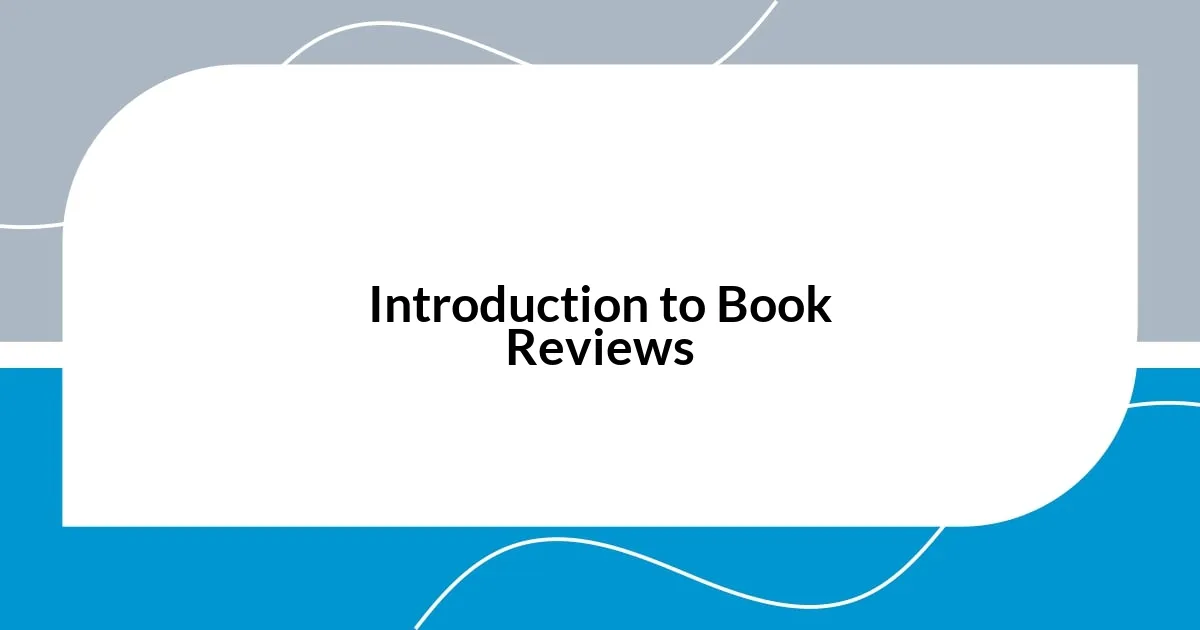
Introduction to Book Reviews
Book reviews are fascinating windows into the literary world, offering not just summaries, but often deep insights and personal reflections on the themes, characters, and overall messages of a book. I remember the first time a review changed the way I perceived a story; it was as if I had discovered layers I had missed completely. How often do we read a book, only to find out later that others saw something entirely different or profound in it? That’s the magic of reviews.
When I dive into a book review, it feels almost like having a conversation with a friend who has insights I haven’t considered. Each review opens up new avenues of thought, urging me to reconsider my interpretations and feelings about the text. Have you ever read a review that made you rush back to the book, eager to see the nuances highlighted by the reviewer? I often find myself reflecting on how a single perspective can enrich my understanding and appreciation for a book.
Moreover, writing my own reviews has become a form of exploration for me. It’s a chance to articulate my thoughts and feelings, sparking an understanding that goes beyond the story itself. I cherish the moments when I can share my reactions and connect with fellow readers. Isn’t it wonderful how a simple written piece can foster a sense of community among readers?
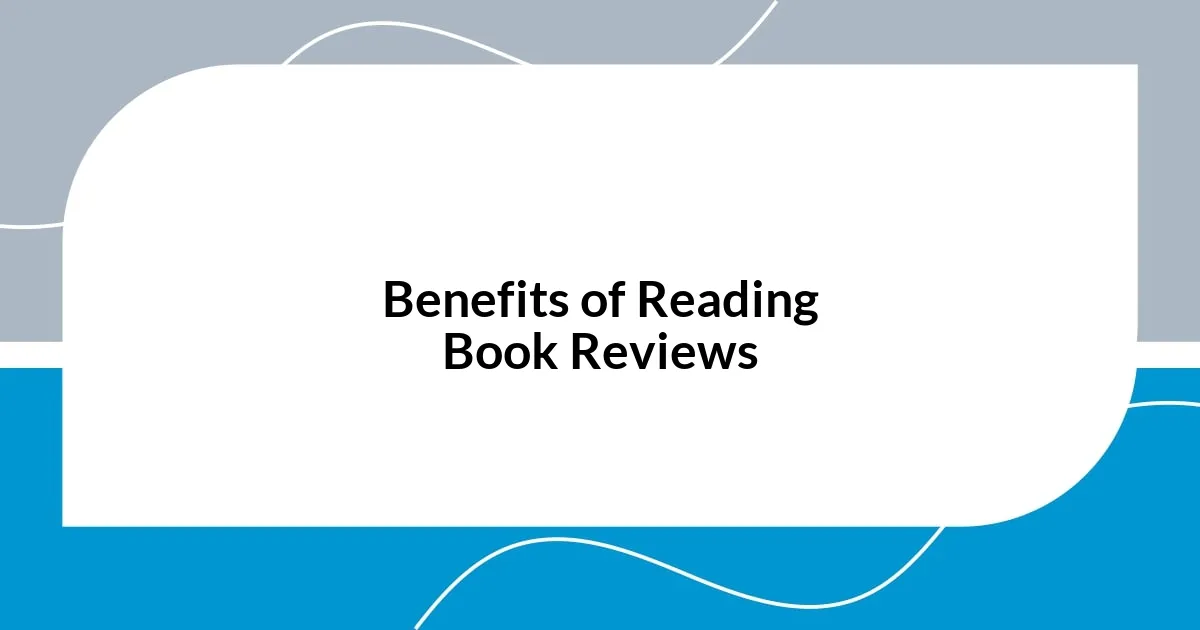
Benefits of Reading Book Reviews
Reading book reviews offers a unique perspective that can truly enhance our reading experience. I once stumbled upon a review of a novel I thought was straight forward. However, the reviewer uncovered themes of identity and self-discovery that I had glossed over. That realization was eye-opening! It reminded me that everyone has different lenses through which they view stories, and that diversity enriches our understanding.
Another invaluable benefit of book reviews is the efficiency they bring to our reading choices. I’ve often found myself swayed by a compelling review, leading me to pick up a book I might have otherwise overlooked. For instance, I was on the fence about a sci-fi novel until I read a passionate review. Surprisingly, it became one of my favorites! Reviews can save us time and effort, guiding our literary journeys more effectively.
Lastly, engaging with book reviews fosters a vibrant reading community. Sharing thoughts about our reads after connecting with reviewers can spark delightful conversations. I’ll never forget the spirited debate I had with a friend about a book we both read after analyzing a review together. It’s moments like these that highlight the social benefits of reading and discussing reviews, bringing readers closer through shared experiences.
| Benefits | Examples |
|---|---|
| Enhanced Understanding | New themes and insights revealed in reviews can alter perceptions of a book. |
| Informed Choices | Passionate reviews can persuade readers to explore new genres and titles. |
| Community Engagement | Discussion from reviews fosters relationships among readers. |
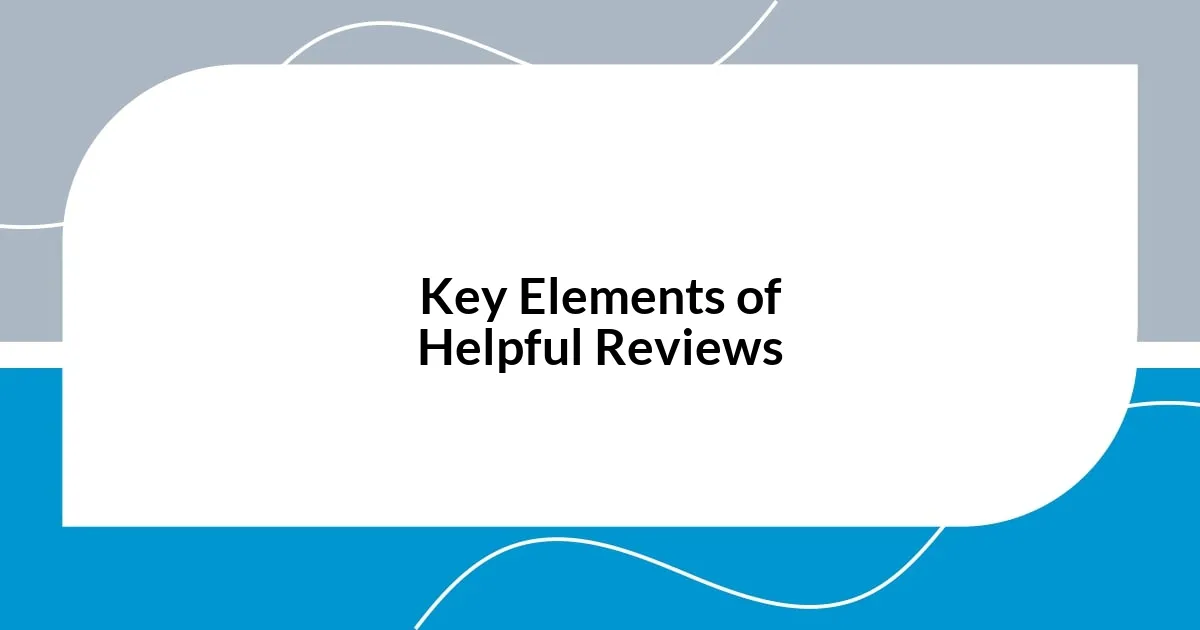
Key Elements of Helpful Reviews
Understanding the key elements that make a book review helpful can truly transform our reading experience. One crucial aspect, I’ve found, is how well the reviewer articulates their thoughts and feelings about the book. When reviews include specific examples from the text, it not only strengthens their points but also appeals to those of us who sometimes feel lost in literary discussions. A personal experience sticks with me: I once read a review that not only critiqued the protagonist’s journey but also shared how the reviewer related to their struggles. That connection made the review resonate deeply, highlighting the power of personal anecdotes.
Helpful reviews often feature a clear structure, allowing readers to navigate through opinions and insights easily. Including a succinct summary, followed by a breakdown of strengths and weaknesses, can make all the difference. Here’s a list of key elements I consider essential for a constructive review:
- Clear Summary: A brief overview of the book’s plot and themes sets the stage.
- Personal Connection: Sharing personal experiences or feelings creates relatability.
- Supporting Evidence: Specific quotes and examples from the book bolster opinions.
- Balanced Analysis: Addressing both strengths and weaknesses provides a rounded perspective.
- Engaging Tone: A friendly and conversational voice invites readers into the discussion.
Reflecting on my favorites, those that embrace these elements transform mere recommendations into heartfelt discussions that linger in my mind long after I’ve turned the last page.
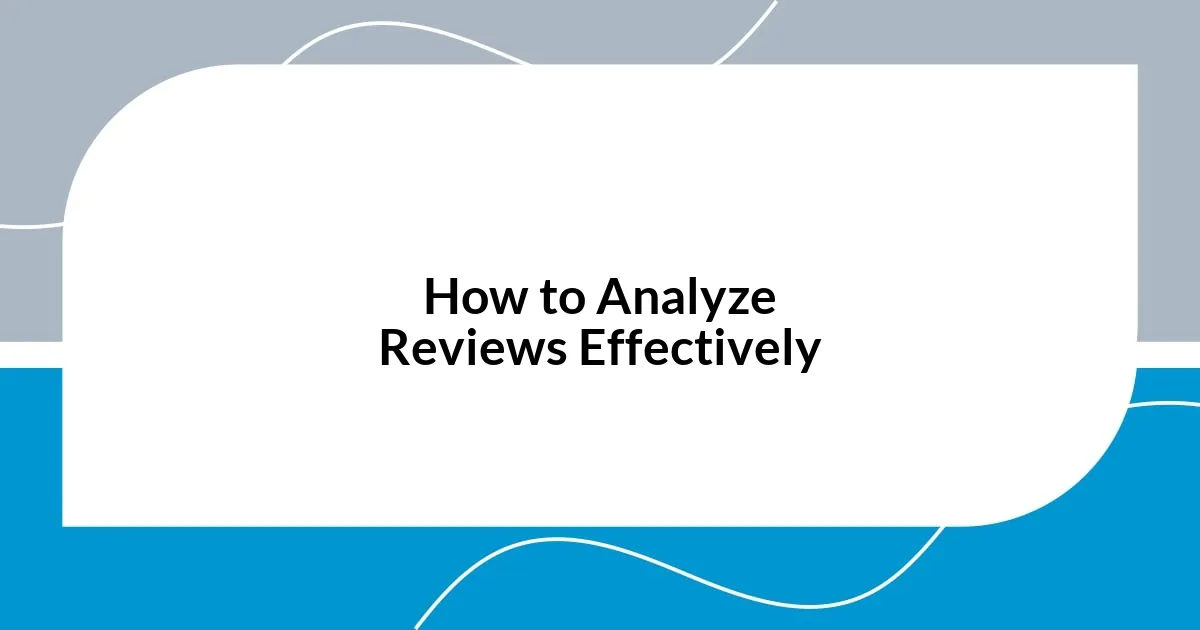
How to Analyze Reviews Effectively
When analyzing book reviews, I find it helpful to note the emotions behind the words. For instance, I once read a review that practically sang praises for a fantasy novel. The reviewer’s excitement was infectious, and I realized I felt the same way after finishing the book. Have you ever connected deeply with a reviewer’s passion? It can completely shift your own perspective about a book.
Another effective method is to look for consistency across multiple reviews. If several reviewers mention the same strengths or weaknesses, it’s likely that those elements are significant. I remember considering a thriller that was praised for its suspense but criticized for weak character development. I found that to be a useful guide when I finally picked it up. It made me approach the story with tempered expectations, which ultimately enhanced my enjoyment.
Lastly, I urge you to trust your gut feeling after reading a review. While opinions vary, understanding what resonates with you is vital. I’ve passed on books that others raved about because something in the reviews just didn’t click for me. It always pays to listen to your instincts; after all, reading should be a personal and enjoyable journey!
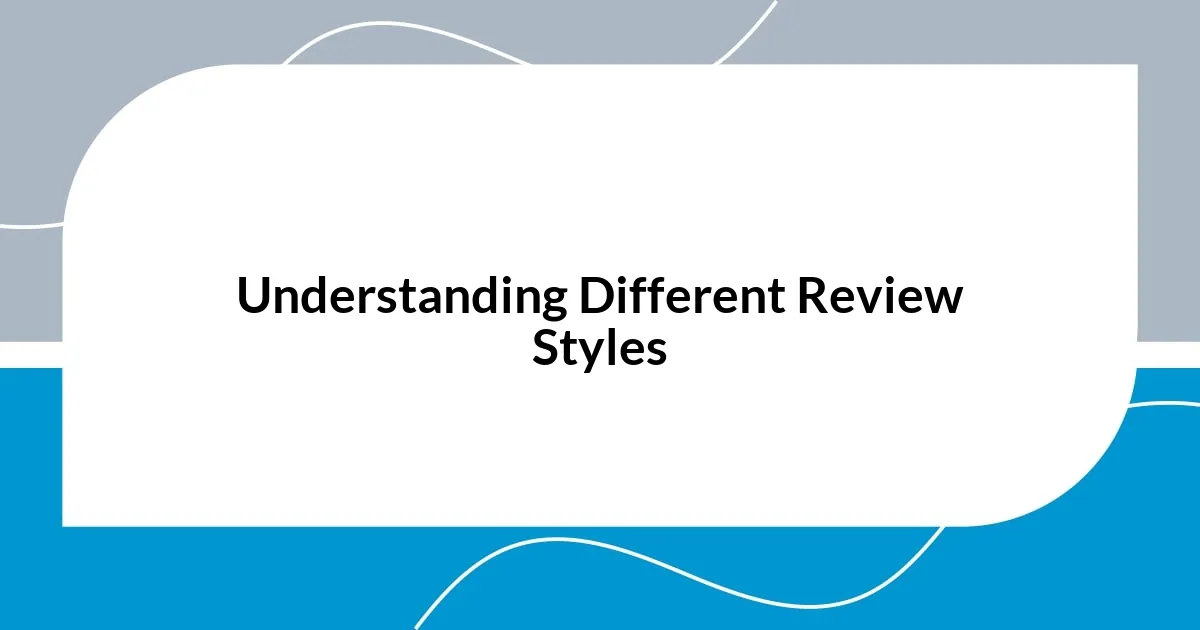
Understanding Different Review Styles
Understanding different review styles can be a fascinating journey. Some reviews lean heavily on emotional resonance, painting vivid pictures of the reader’s experience. I recall an instance when I read a review that captured the emotional weight of a romance novel so well that it prompted me to pick it up, eager to feel the same rush. Have you ever felt compelled by a review that seemed to tap into your own emotions? It’s like discovering a shared heartbeat between the writer and the reader.
Conversely, some reviews adopt a more analytical approach, delving deep into themes, symbols, and literary techniques. I often appreciate this style when I want a deeper understanding. A review I encountered dissected a classic novel, examining its historical context, and it opened my eyes to layers I hadn’t noticed before. It made me reflect on how understanding the backdrop can enrich our reading experience. How does a book’s context influence your thoughts on it?
Lastly, I’ve noticed that some reviewers embrace humor and a casual tone, making the reading process feel like a conversation with a friend. I distinctly remember a review filled with witty remarks about a quirky character, which not only entertained me but made the review memorable. These refreshing styles can make the sometimes daunting task of choosing a book feel much lighter. What style do you tend to gravitate towards when reading reviews?
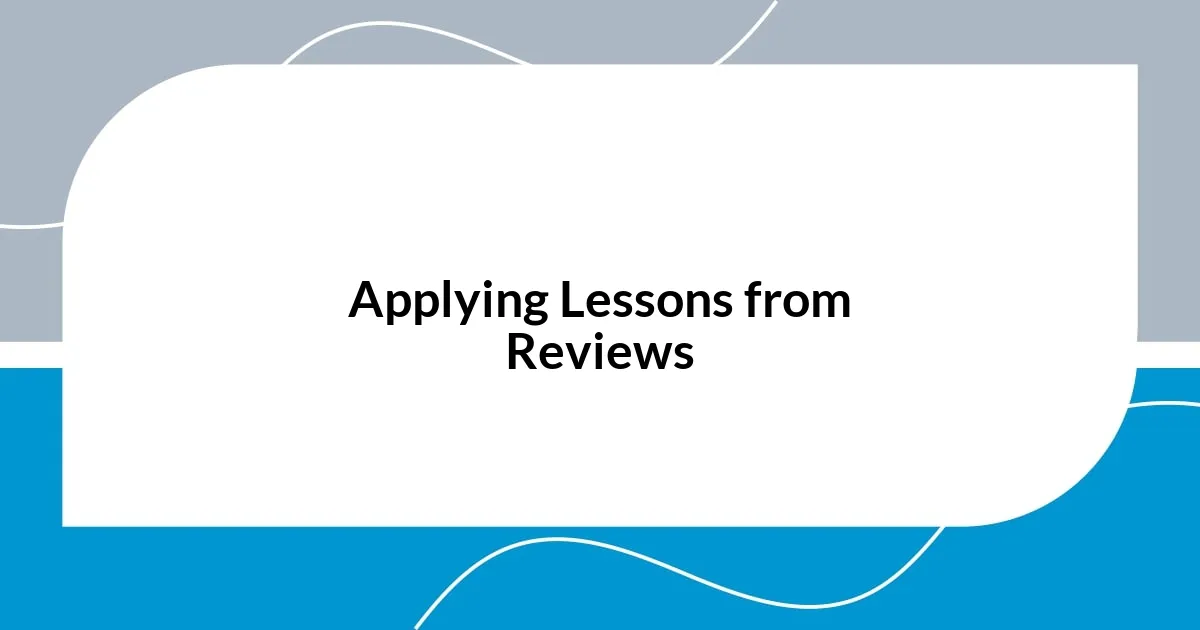
Applying Lessons from Reviews
When I try to apply lessons from reviews, I often focus on the unique insights that each critic shares. For example, I remember reading a review that highlighted hidden symbolism in a novel. It was a revelation! After learning about these layers, I went back and re-read the book with fresh eyes, discovering themes I had previously missed. Have you ever felt that thrilling surprise when a simple review unlocks deeper meanings?
Another approach I find valuable is to consider the context of the reviewer’s perspective. One reviewer I followed spoke candidly about their personal struggles with anxiety, connecting it to a book about mental health. This personal touch made me reflect on how subjective our reading experiences can be. How does a reviewer’s background shape what they notice or feel while reading? It’s fascinating to think that a piece of literature can resonate so differently based on individual experiences.
I also believe in making actionable decisions based on reviews rather than just absorbing opinions. After noticing a trend where novels featuring strong female protagonists received high praise, I sought them out specifically. I chose one such book on a whim, and it turned out to be transformative. It’s about curating your reading list in a way that genuinely resonates with your interests. What have you discovered about your preferences through the lessons in reviews?
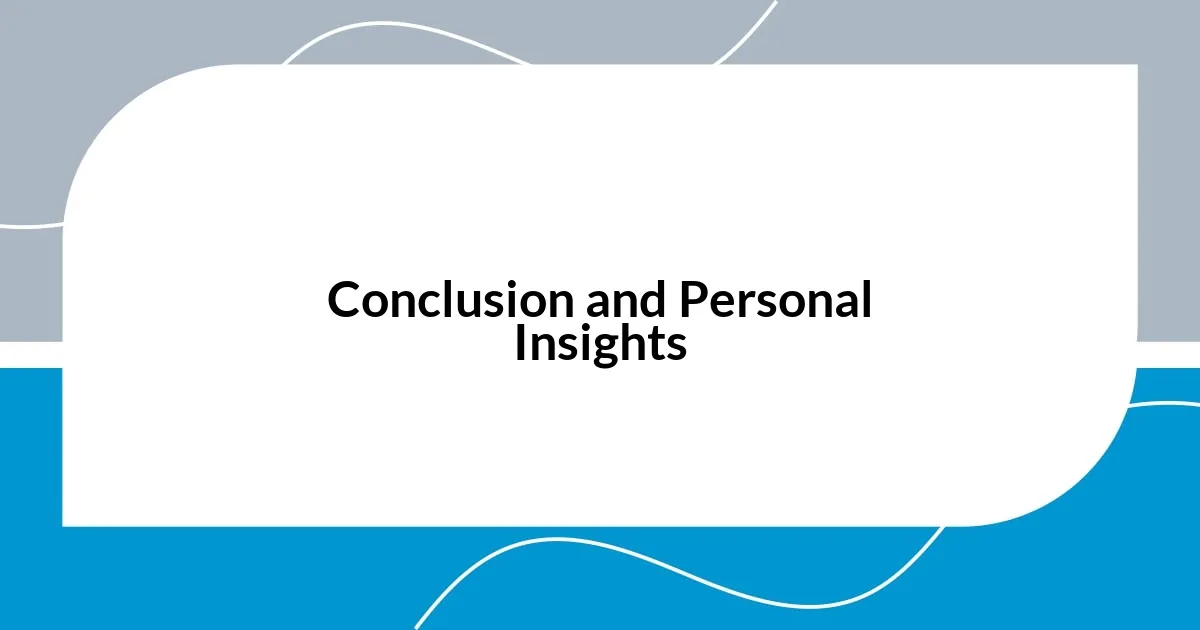
Conclusion and Personal Insights
Reflecting on the myriad of insights I’ve gleaned from book reviews, I realize just how deeply reviews can shape my reading journey. I remember when I stumbled upon a review that eloquently described the transformative power of a particular memoir. That review resonated so strongly with my own experiences that it made me ponder the ways literature can mirror our lives. Have you ever been struck by a review that made you see a part of yourself in a story?
One insight that stands out is the importance of recognizing bias in reviews. I once encountered a review for a popular fantasy series where the critic mentioned their childhood attachment to similar stories. This detail shifted how I perceived their analysis, prompting me to question how my own background might influence my interpretations. It’s an essential reminder that every reviewer approaches a book with their unique lens. How does your perspective influence your reading choices?
Additionally, I’ve learned that some of the most insightful comments arise from genuine critiques. I recall reading a review that was not afraid to tackle the shortcomings of a highly praised novel. That honesty allowed me to cultivate realistic expectations while exploring new titles. It’s crucial to seek out diverse opinions, as they can illuminate aspects of a story that we might overlook. What lessons have you learned from both the praises and pitfalls pointed out in reviews?